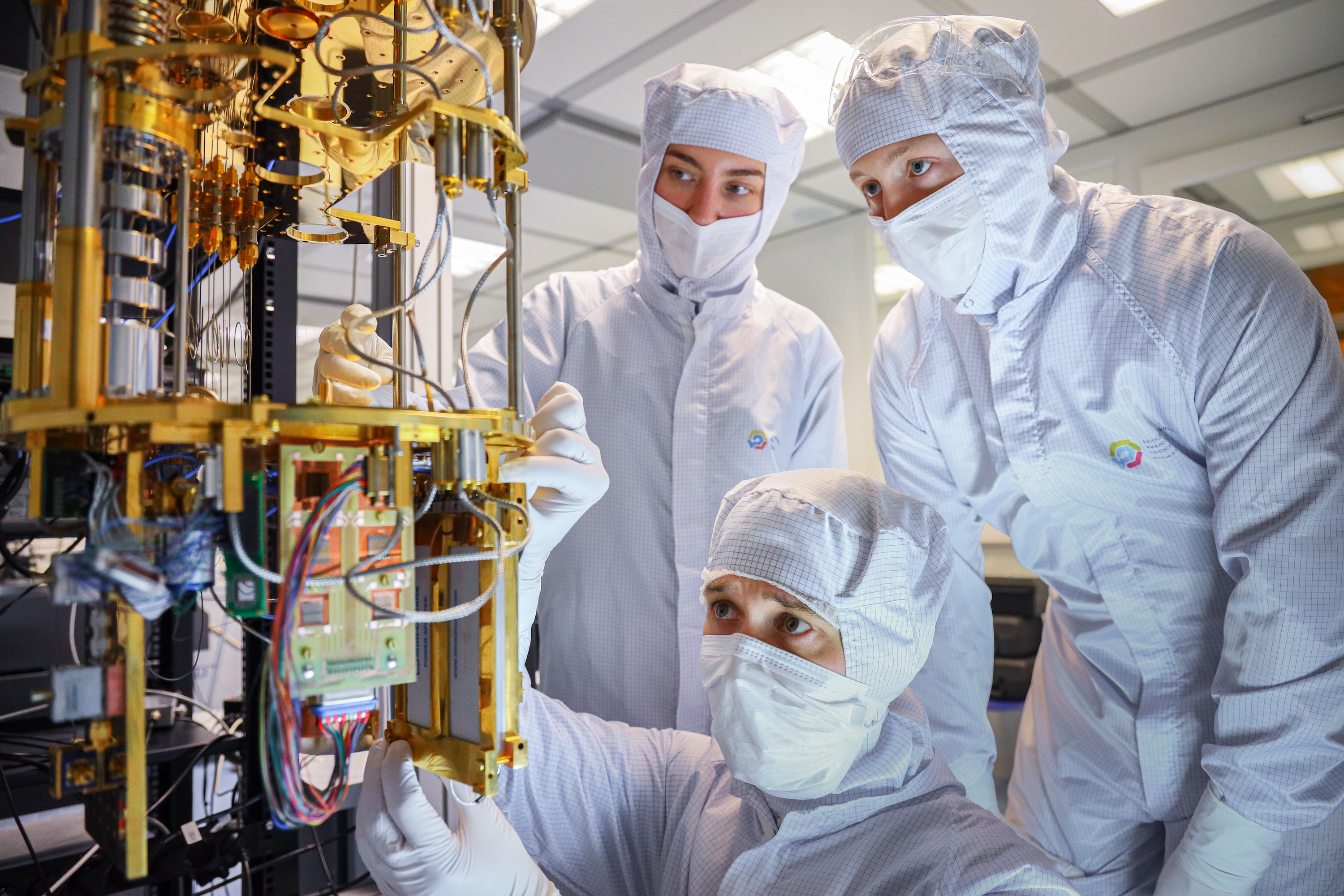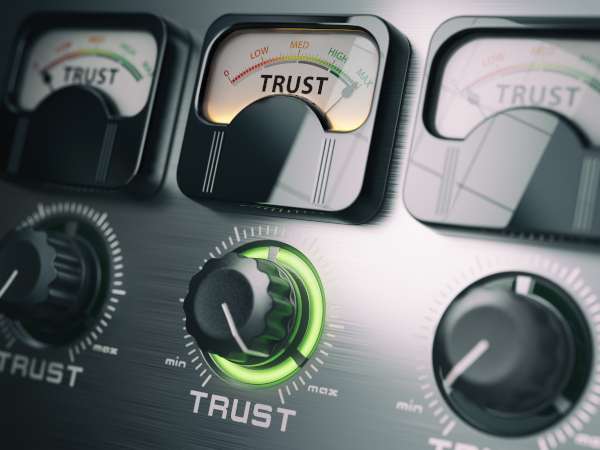Quantum Leap: Canada's big ambitions in a sub-atomic sector
NOTE: See also the main story, “Quantum strategy comes at a critical moment”

They are at different stages in their journey as entrepreneurs, but Dr. John Davis, PhD, and Jordan Smith both are examples of Canada’s emerging quantum industry leaders.
Davis is a professor of physics at the University of Alberta. He is also founder and chief technology officer at Zero Point Cryogenics in Edmonton.
Based on two decades of his university research on ultra-low temperatures, Davis spent five years developing an innovative “dilution refrigerator” technology.
“Dilution refrigeration is sort of like the motherboard for that [quantum computer] chip,” Davis told Research Money. “It’s the core enabling platform for quantum technology.”
Quantum researchers at universities, government laboratories, and quantum computing companies use dilution refrigerators to cool quantum computer processors to minus 272.1 degrees C, which changes what goes on at the sub-atomic level. Electrons travel through wires without resistance, the property known as superconductivity, which is critical to the viability of quantum computer hardware.
Almost all dilution refrigerators are currently made in Europe, apart from one company in the U.S. Edmonton-based Zero Point Cryogenics is the only Canadian manufacturer of the technology. Since being founded in 2017, the company has grown to 16 employees working in a 5,000-square-foot facility in Edmonton. They are now building the firm’s first commercial dilution refrigerator product, which has been purchased by the National Research Council (NRC), through Innovation Solutions Canada, the federal government’s procurement program.
Provincial and federal government support has been crucial in getting to this point, Davis said. The company secured a grant from Alberta Innovates to build a prototype dilution refrigerator. NRC’s Industrial Research Assistance Program also provided funding in the early stages Prairies Economic Development Canada provided the company with a low-interest loan, when the big banks would not take the risk.
“Banks are really tough to deal with," Davis explained. "They won’t give you money until you prove you don’t need it.”
Zero Point Cryogenics has also lined up its second customer, an academic researcher at Michigan State University, who is scheduled to receive a unit this fall.
Davis said that compared with other dilution refrigerators on the market, Zero Point Cryogenic’s units are much more compact, fully automatic with intuitive touchscreen technology, and designed for easy, simple operation by one person.
As more and more quantum computers are developed and deployed, he noted, server farms that currently provide access to traditional computers will be replaced by quantum computer farms. “We’ll have thousands or tens of thousands of these dilution refrigerators in these quantum server farms.”
The quantum sector is expected to become a $139-billion industry in Canada, with more than 200,000 jobs and $42 billion in returns by 2045, potentially contributing three per cent to Canada’s GDP, according to a study commissioned by the NRC. In this context, Davis added, Zero Point Cryogenics has deliberately avoided venture capital funding.
“What they [venture capital firms] want to do is get a return on their investment," he argued. "They’re not interested in building a company that’s going to be a valuable company for the quantum sector in Canada. And my goal is to build something substantial for Canada.”
Ensuring secure quantum communications
Academic entrepreneur Jordan Smith doesn’t yet have a product ready to market, but he’s definitely hard at work on it.
Quantum computing is advancing so rapidly, hackers will soon be able to break current encryption methods and steal or tamper with sensitive information in databases around the world.
“Once that happens, nothing is secure,” said Smith, who has just completed his Master’s degree in physics at the University of Calgary, where he’s participating in the Academic Entrepreneurs in Residence program.
Smith graduated from the Haskayne School of Business with a commerce degree in 2011, then founded and managed several small businesses. He wanted to get more technical training, so he returned to UCalgary in 2017, to study physics.
During his undergraduate study, he worked with UCalgary theoretical physicist and quantum communication expert Dr. Christoph Simon, PhD, on projects exploring quantum phenomena.
The pair teamed up with experimental physicist Dr. Daniel Oblak, PhD, an expert in implementing quantum communication and quantum cryptography systems.
Smith went on to do his Master’s thesis in experimental quantum cryptography in Oblak’s Quantum Cloud Lab at UCalgary, developing a prototype device that uses a novel approach to quantum key distribution (QKD), which enables users to create and share an identical string of bits, called a key, to encrypt data at the sender’s end and decrypt it at the receiver’s end.
QKD systems are hard to crack, but Smith pointed out their “Achilles’ heel". The hardware that detects and measures the incoming bits (encoded in single photons of light), is itself susceptible to hacking, even without using a quantum computer.
To overcome this problem, Smith, Simon and Oblak developed a novel approach, called measurement device independent QKD, where the security of the encryption key no longer depends on how secure the hardware is. Hackers cannot use it to get the information needed to crack the encryption key. The three investigators subsequently co-founded a startup, called Quantized Technologies Inc. (QTI), to commercialize and market this technology. Smith, the company's CEO, said QTI’s prototype device should be ready for testing within the next several months.
The global market for quantum cryptography technologies is expected to reach at least $13 billion annually within the next five to 10 years.
“Based on our technology and its competitive difference compared to other QKD technologies," Smith concluded. 'I think it’s reasonable to expect that we can capture five percent or more of that market."
Building a Canadian quantum network
Along with UCalgary’s Academic Entrepreneurs in Residence program, Smith received support from the multinational technology network, Creative Destruction Lab, a mentor-based nonprofit that has helped launch more than 50 Canadian quantum firms through its quantum stream.
As part of the National Quantum Strategy’s goal, to create a national secure quantum communications network, Canada is building its first quantum communications satellite, called the Quantum Encryption and Science Satellite, or QEYSSat.
The micro-satellite, weighing about 100 kilograms and equipped with an eight-inch refractor telescope, is being built by Honeywell Canada.
The Canadian Space Agency is funding the QEYSSat mission, which includes several government, academic and industry partners.
The mission’s aim is to demonstrate secure quantum communications, using quantum key distribution, between ground stations and space, said QEYSSat scientific lead Dr. Thomas Jennewein, PhD, associate professor of physics and leader of the Quantum Photonics Laboratory at the Institute for Quantum Computing at the University of Waterloo
At last month's Quantum Days conference, hosted by Deep Tech Canada, he described the limited transmission distances of ground-based networks using fibre optic channels. Satellites are therefore expected to play a critical role in building a global quantum network, similar to the numerous satellites used today in “classical,” or non-quantum communications systems.
Satellites have already achieved quantum entanglement distribution — necessary for a global quantum network — of more than 1,000 kilometres, Jennewein said. “Thousands of kilometres is doable.”
China has used its Micius satellite, which is solely dedicated to quantum information science, to build a working space-to-ground quantum communications network, stretching more than 4,600 kilometres, and communicating across continents.
Canada’s QEYSSat mission involves collaboration by close to 20 research partners at various research universities and facilities. Scheduled for launch in late 2024 or in 2025, the mission’s activities will include:
- interfacing a space link with a ground network;
- conducting space link experiments with quantum memories (the quantum-mechanical version of classical computer memory);
- testing novel single-photon detectors;
- testing novel quantum sources on the ground; and
- developing quantum communication protocols.
Follow-up missions are planned “to demonstrate the building blocks of a Canadian-wide quantum internet,” Jennewein said.
Establishing a Canadian quantum communications network “is a very big deal,” said Dr. Stephanie Simmons, PhD, co-chair of the National Quantum Strategy Advisory Committee. “I’m not aware of any other country outside of China and perhaps somewhere in the EU that has committed to this at a national level.”
Advancing development of quantum sensors
Another quantum technology, quantum sensors, is one of three core missions in Canada’s National Quantum Strategy. By 2026, the global market for quantum sensors is projected to be nearly US$550 million, according to the federal government.
The Department of National Defence, through its Innovation for Defence Excellence and Security (IDEaS) program has supported innovators with $8.2 million to develop field-deployable quantum sensing technologies.
In 2021, the NRC launched the Internet of Things: Quantum Sensor Challenge program, focused on developing revolutionary sensors that use the extreme sensitivity of quantum systems to enhance measurement precision and sensitivity rates, and expand the kinds of phenomena that can be measured.
In February 2022, Innovative Solutions Canada (ISC) launched two calls to advance quantum sensing prototypes and supporting technologies: one to support the development of a quantum-level biophoton optical imager and another to develop ultrasensitive spectroscopy systems for quantum photonics.
In June 2022, ISC launched a call to support pre-commercial quantum sensor prototypes that can measure a variety of physical quantities, including electric or magnetic fields, precise timing, temperature, and chemical or biological processes.
The Canadian quantum industry’s national association is Quantum Industry Canada, a consortium of quantum technologies companies that includes developers of technologies for quantum computing, quantum communications, quantum-safe cryptography and quantum sensing.
Rachel Taylor, a board member for Quantum Industry Canada, welcomed the launch of the National Quantum Strategy.
“We really need to provide that evidence that Canada is committed to quantum, Taylor said during the Quantum Days conference. “We want to grow Canada as a hub for quantum.”
Taylor is co-founder and chief operating officer of SBQuantum, a startup in Sherbooke, Quebec that employs diamond-based quantum sensors to provide inspection solutions for underground or undersea infrastructure.
R$
Events For Leaders in
Science, Tech, Innovation, and Policy
Discuss and learn from those in the know at our virtual and in-person events.
See Upcoming Events
You have 0 free articles remaining.
Don't miss out - start your free trial today.
Start your FREE trial Already a member? Log in
By using this website, you agree to our use of cookies. We use cookies to provide you with a great experience and to help our website run effectively in accordance with our Privacy Policy and Terms of Service.





